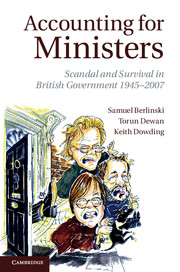Book contents
- Frontmatter
- Contents
- List of figures
- List of tables
- Preface and acknowledgements
- 1 Introduction
- 2 Managing the cabinet: principal–agent relations in government
- 3 The structure of British government
- 4 Who serves in government and how long do they last?
- 5 The prime minister and cabinet
- 6 Performance measures and forced exits
- 7 Ministerial performance and tenure
- 8 Conclusion
- References
- Index
6 - Performance measures and forced exits
Published online by Cambridge University Press: 05 April 2012
- Frontmatter
- Contents
- List of figures
- List of tables
- Preface and acknowledgements
- 1 Introduction
- 2 Managing the cabinet: principal–agent relations in government
- 3 The structure of British government
- 4 Who serves in government and how long do they last?
- 5 The prime minister and cabinet
- 6 Performance measures and forced exits
- 7 Ministerial performance and tenure
- 8 Conclusion
- References
- Index
Summary
Introduction
In this book we are analysing the length of ministers' spells in office based upon characteristics that are fixed at the time of their entry and what happens to them in government. We ask what effect political events, such as resignation calls, have on ministerial tenure. Such calls, whilst subject to the noise associated with adversarial British politics and a mass media increasingly hunting for controversy, provide a measure of ministerial performance. In Chapter 7 we will be examining in detail the effects on ministerial tenure of calls for resignation. In this chapter we introduce our performance measure and examine one aspect of the measure – when a minister is forced to leave government following a call for his resignation.
A forced exit is a ministerial resignation which occurs without the planning of the prime minister. It might occur because a minister decides to quit – perhaps in consequence of personal conflict with the prime minister or with other ministers, or because of his disagreement with some aspect of government policy. These cases fall under the rubric of resignation due to collective responsibility: the minister no longer feels able to take on part of the collective responsibility for government policy. More often, however, forced exits occur because of some specific issue: a controversy or a scandal that embroils the minister. These cases are ones of individual ministerial responsibility. Either way round we call such problems – whether they actually lead to resignation or not – ‘resignation issues’.
- Type
- Chapter
- Information
- Accounting for MinistersScandal and Survival in British Government 1945–2007, pp. 117 - 149Publisher: Cambridge University PressPrint publication year: 2012



